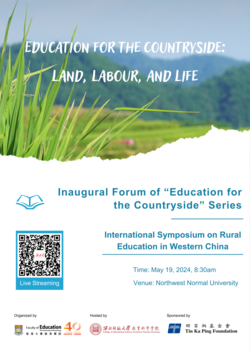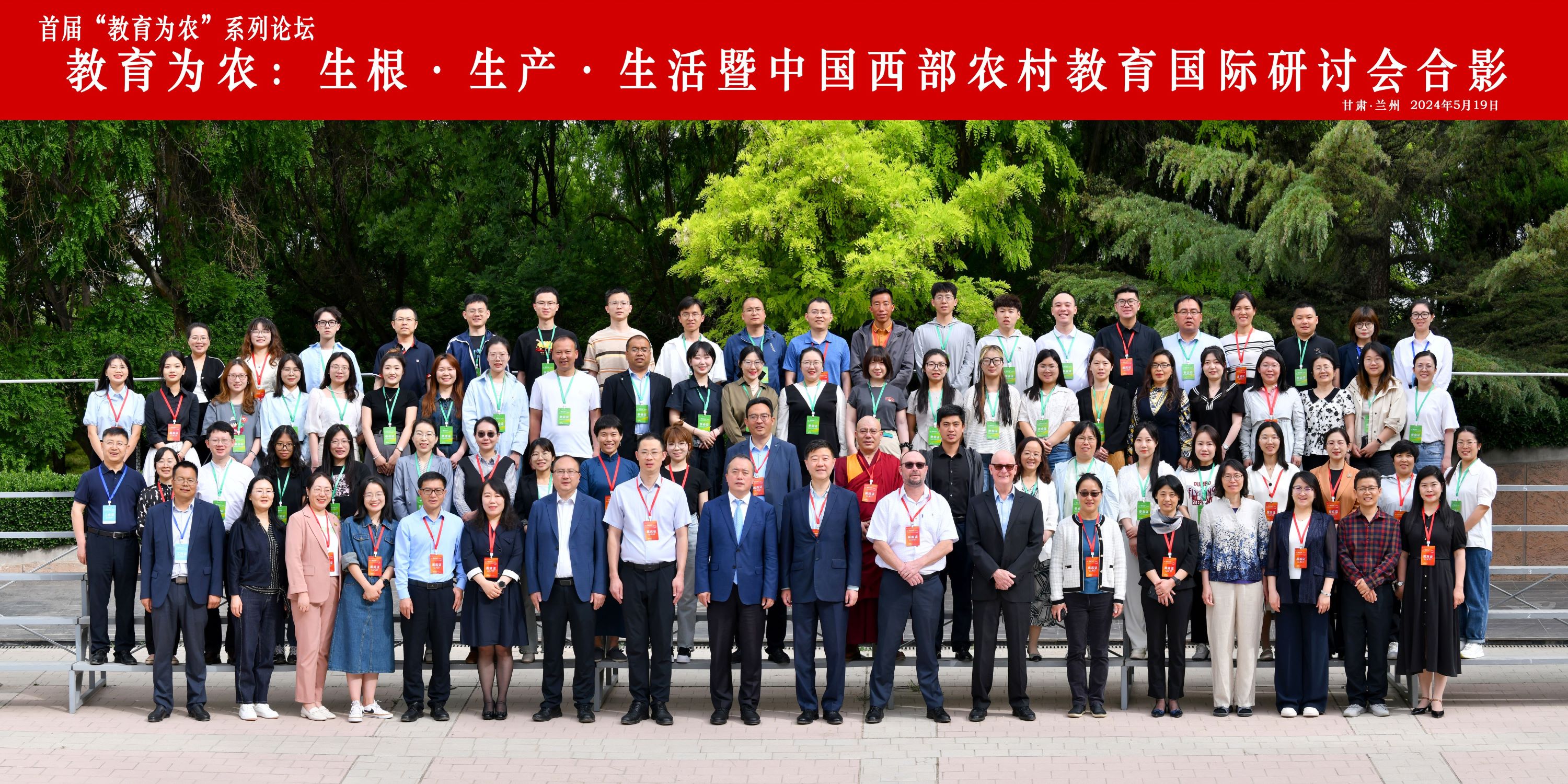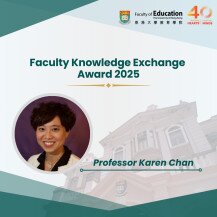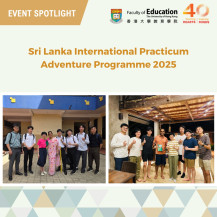Successful Convening of the Inaugural Forum of “Education for the Countryside” Series
Updated on May 19, 2024 (Sun)


Please click the links below to view the video recording of this forum:
- Keynote Speech by Professor Wang Dan
- Keynote Speech by Professor Michael Corbett
- Keynote Speech by Professor Philip Roberts
- Principal Dialogue
- Roundtable Session
The “Education for the Countryside” Forum Series, initiated by the Faculty of Education (the Faculty) at The University of Hong Kong (HKU) and sponsored by the Tin Ka Ping Foundation, was successfully launched in Lanzhou on May 19, 2024. The Inaugural Forum, co-organised by HKU Faculty of Education and the College of Educational Sciences at Northwest Normal University, championed the theme “Education for the Countryside: Land, Labor, and Life”. The forum called for a fundamental shift in the aims of rural education from social mobility to the cultivation of rural contributors to local development. It consisted of keynote speeches, parallel panels, principal dialogues, and a roundtable session, with over 40 presentations online and offline viewed by 592,000 audience nationwide via live streaming.
The forum started by enthusiastic opening remarks made by Professor Wang Zhanren, President of Northwest Normal University, Professor Yang Rui, Dean of Education, HKU, and Mr David Day, Chief Executive of the Tin Ka Ping Foundation.
In the keynote speech session, Professor Wang Dan from HKU explained the purpose of the forum by presenting the necessity of reorienting education toward the wellbeing of rural communities. She contended that rural schools may disappear, but the countryside will stay. Rural well-being lies in lively renewed cultures, vibrant collective economy, development of ecological agriculture, and visionary young returnees. Rural education should return to its public nature and serve rural public needs.
Professor Michael Corbett from Acadia University, Canada, continued the discussion by confronting two ironies in rural education. One irony is the urban hegemony in a rural world, and the other lies in the function of rural schooling in facilitating rural outmigration. These ironies reveal a common phenomenon in rural education: “Learning to leave.” Prof. Corbett called for deep structural reform in education to advance rural communnal sustainability.
Professor Liu Shanhua from Northeast Normal University reported on the strategic transformation of rural education in face of the sharp decline of school-age population. He proposed policy reforms to make education more equitable, high-quality, diverse, and modern by optimising resource allocation and expanding school functions.
Professor Philip Roberts from University of Canberra, Australia, introduced the concept of rural knowledges, in plural form. He criticised the urban paradigm that shapes rural curriculum and teaching. He argued that rural areas should go beyond the metropole knowledge and reconstruct place-based curricula and education that contribute to local economy and life needs.
Following the keynote talks, around 20 researchers and practitioners presented in four parallel panels on topics of “Education Urbanization and Rural Transformation”, “Population Mobility and Rural Identity”, “Teacher Education and Urban-Rural Integration”, and “Past and Future of Rural Education”.
The Inaugural Forum also featured a “Principal Dialogue” that showcased innovative ideas and practices from three rural schools. Mr Wang Muliang from Dazu Primary School in Sichuan Province instroduced the village-school collaboration practices that helped promote the integration of schooling and the community through farm projects. Ms Zhao Yinfeng from Dasendian Primary School in Hebei Province shared her experience of integrating the school into the village community to serve the left-behind elderly and women, change the mindset of villagers, update skills of farmers, and promote mutual benefits between the school and the community. Mr Jimeijianzan from Jimeijianzan Ethnic Vocational School in Qinghai Province advocated for a combination of tradition and modernity to strengthen Tibetan culture and language. The school also established professional programs to meet the economic needs of pastoral areas and to nurture talents for local sustainable development.
The forum was concluded by a cross-disciplinary dialogue between agrarian development experts and rural educational workers to envision an “Education for the Sustainable Countryside”. Professor Hu Yuegao from China Agricultural University listed the severe crises faced by agriculture and rural communities in China. For solution, he proposed a five-dimension comprehensive development plan for rural revitalization. Professor Yan Hairong from Tsinghua University observed alienation of agriculture from local communities due to capitalization of agricultural production. The key to rural revitalization, she argued, would be the new collective economy that serves public goods. Rural development must be advanced on multiple fronts, including economic, social, cultural, and ecological aspects, to ensure long-term sustainability. These talks brought fresh understandings about rural predicaments that stimulated reflections on the purpose and practices in education.
In summary, the forum rejected the inevitability of urbanization and called for incorporation of rural and agricultural issues into school curriculum as a significant focus. The educational system should not train human resources for the urban labor market only. It should also bear the responsibility to cultivate talents for rural and agricultural revitalization. Rural development is of strategic importance for national security and stability. Therefore, rural education must correct its excessive tendency towards credentialism and serve the well-being of rural communities and the nation’s public interest.
The Forum Series will continue in the coming years as an effort to reverse the trend of education urbanization and explore the paths for education to serve the countryside. The HKU Faculty of Education will continue seeking collaboration with mainland universities for co-organisation of future forums.
Click here to view the event photos.



